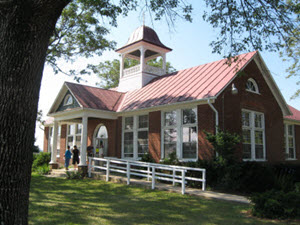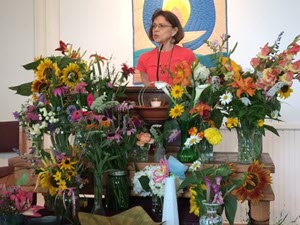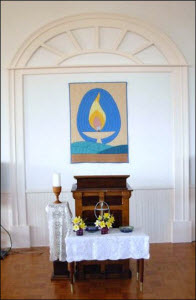
HUU Sermon Archives
Thomas Wentworth Higginson: The Uncanonized Unitarian
By Robin McNallie
January 9, 2005
 I
have chosen this morning to pay tribute to Thomas Wentworth Higginson, an American
Unitarian minister, also writer, editor, lecturer, and activist, who lived from
1823-1911. My reason for commemorating Higginson can be explained by calling your
attention to the fact that in addition to our 7 principles, we UUs are also invited
to heed what can be seen as an addendum to those principles, which we call the Living
Tradition. That tradition reminds us among other things to honor the “words and
deeds of prophetic men and women which challenge us to confront powers and structures
of evil with justice, compassion and the transforming power of love.” And, since
January is a time for looking back as well as forward, this seems an especially
appropriate occasion to talk of Higginson, the man I have dubbed the Uncanonized
Unitarian.
I
have chosen this morning to pay tribute to Thomas Wentworth Higginson, an American
Unitarian minister, also writer, editor, lecturer, and activist, who lived from
1823-1911. My reason for commemorating Higginson can be explained by calling your
attention to the fact that in addition to our 7 principles, we UUs are also invited
to heed what can be seen as an addendum to those principles, which we call the Living
Tradition. That tradition reminds us among other things to honor the “words and
deeds of prophetic men and women which challenge us to confront powers and structures
of evil with justice, compassion and the transforming power of love.” And, since
January is a time for looking back as well as forward, this seems an especially
appropriate occasion to talk of Higginson, the man I have dubbed the Uncanonized
Unitarian.
Indeed, who here has heard of Higginson so as to be able to name one significant thing he did or said?
As I thought, a few of you were able to identify Higginson as the somewhat uncomprehending mentor of Emily Dickinson: One of the few admitted into her presence during her long seclusion. He was invited twice, roughly equivalent to being invited twice for an audience with the Pope. He also was one of the few outsiders invited by her family to participate in her funeral. Actually, I knew some other things about Higginson besides this, because of my specializing in that area of American culture and history, but even I did not know the full range of his achievement until I picked up this book, The Magnificent Activist, a collection of his essays edited by Howard N. Meyer with an extremely informative introduction to Higginson. In the time allotted me, it would be impossible to give a full account of his contributions but I will touch some highlights.
He lived, as I have said, from 1823-1911, a swath of time marked by great and cataclysmic events and changes: The Mexican War, the Civil War, Reconstruction and the Gilded Age, the Spanish-American War and the War in the Philippines. Higginson openly opposed the Philippine intervention, along with his more famous contemporary, Mark Twain. His first 20 years are interesting in forming Higginson’s character and commitment to various causes. He was born in Cambridge, Mass., to an old New England family, much like Emerson, whom Higginson’s mother took him to hear lecture when Higginson was a boy of 12 in 1835, a year before Emerson’s famous “Nature” essay, generally considered the manifesto of the Transcendentalist movement. Higginson’s father had died the year before, in 1834, so he grew up in an all-female family. This fact, and his mother’s influence especially, probably explain his later strong commitment to women’s rights. Meyer, in fact, views Higginson as the leading male feminist of 19th Century America. In his old age, Higginson paid tribute to his mother in an essay titled “The Woman who Most Influenced Me.” There, he said she directly contributed to “Three Leading Motives” of his life – “the love of personal liberty, of religious freedom, and the equality of the sexes.”
Higginson graduated from Harvard the youngest of that year’s graduates at 18, and second in class standing. Soon thereafter he visited Virginia relatives and first viewed directly the reality of slavery. At this point, I think it’s best to turn from a chronological consideration to a topical look at Higginson, using his self-declaration of the three leading motives of his life as a template:
1: The love of personal liberty.
In 1847, on the occasion of his graduation from Harvard Divinity School, Higginson delivered a sermon titled “The Clergy and Reform,” declaring his belief that Christ’s example called ministers to, first of all, right social wrongs, rather than merely to discuss theological doctrine or even perform church rituals. He may well have been the most radical of all the Abolitionists, excepting probably John Brown. Indeed, Higginson was forced to resign his first ministry in Newburyport, Mass., because of his fervent advocacy of Abolition, an advocacy that disturbed the generally affluent merchant members of the congregation. Three years later, he was called to minister to the Free Church in Worcester, Mass., who took the name, “Free,” because they were “dedicated” in both senses of the word, i.e., to specialize in, and to commit oneself to, the cause of Abolition.
Higginson, when it came to the slavery issue, was not opposed to violence. If, as Holly Near’s hymn that we just sang talks of UU’s as a “gentle, angry people,” in the case of Higginson on Abolition, we have to put the “gentle” in parentheses and the “angry” in italics. In 1856, Higginson was actively involved in the hostilities in “Bloody Kansas,” recruiting and arming settlers there who wanted to make Kansas a free state. Two years previously, he had led the Boston Vigilance Committee in trying to free an ex-slave, Anthony Burns, held in the courthouse there by Federal authorities in support of the Fugitive Slave Act. Higginson also supported John Brown’s raid on Harpers Ferry, and even was working on a plan to forcibly free Brown from his captivity before Brown himself dissuaded him from doing so.
However, perhaps Higginson’s greatest and most overlooked contribution to the cause of Black liberation was his taking command of the first black regiment in the Civil War, an experience he later recounted in his book, Army Life in a Black Regiment, in 1870. Contrary to the impression given by St. Gaudens’ magnificent memorial to Robert Gould Shaw in Boston, and the movie, Glory, it was Higginson who was the first commander of Black troops in the war. At his funeral in 1911, a Black honor guard participated in the ceremony, all born, as Meyer notes, long after the end of the Civil War.
Motive 2: Higginson’s support of religious freedom:
Early in his ministry, in a piece he titled “Scripture Idolatry,” he makes clear that forcing on people one literal reading of the Bible is not only wrong but futile. Many of his observations here resemble those of Chris Edwards in her sermon of a month ago. Chris will now attempt to channel Higginson by reading a representative excerpt from this essay.
It is vain to make a man’s familiarity with the Bible the index of his moral condition. I know very profligate and worldly men, who are ‘mighty in the Scriptures,’ and very pure and noble men who scarcely read them at all. And so various are their contents, that there is room for a wide diversity of tastes, even among those who do read. One enjoys the beautiful piety of the 107th Psalm, and another the horrible curses of the 109th; one the noble heroism of Jewish history, and another its narrow cruelty; one reads the voluptuousness of the Song of Solomon, one the epicurean poetry of Ecclesiastes; one seeks the beatitudes of Jesus, one the metaphysics of Paul, one the romance of Revelation. And their characters may be utterly unaffected by this, for though books have an influence, it is only one influence among many.
In an 1871 pamphlet entitled “The Sympathy of Religions,” Higginson goes beyond advocating freedom of religious interpretation and inquiry to assuming an ecumenical stance in which he emphasizes the core congruencies among all faiths: “Every year brings new knowledge of the religions of the world and every step in knowledge brings out the sympathy between them. They all show similar aims, symbols, forms, weaknesses and aspirations.” This takes us to the third motive:
3: The equality of the sexes.
From 1850, when he signed the call to convene the first National Women’s Rights Convention, in Worcester, Mass., until his death 60 years later, Higginson was, again to cite Meyer, the leading male supporter of women’s rights among his contemporaries. He lectured and wrote constantly on the issue. The titles of three pieces in Meyer’s book are indicative of Higginson pro-woman stance and also of his often ironic, even satirical slant on the issue:
“The Pleasing Art of Self Extinction”
“The Shadow of the Harem”
And, “Ought Women to Learn the Alphabet?”
The last piece was especially popular among women’s rights advocates, first published in Atlantic Monthly in 1860, and reprinted in the same year as a pamphlet. A woman named Sophia Smith later was to claim that “Ought Women to Learn the Alphabet?” inspired her to found that famous college, one of the Seven Sisters, Smith College in Northampton, Mass. When Suffragette Lucy Stone, and Henry Blackwell, decided to marry, they asked Higginson to officiate. Lucy and Henry wanted to use the wedding ceremony to protest the injustices of the marriage institution under the existing statutes. Higginson was a most willing co-conspirator, releasing his own statement along with Lucy’s, insisting on her right to retain her maiden name. He also saw no need to retain the word “Obey” in the marriage vow, and predicted it would, over time, probably be omitted from the ceremony.
There’s so much more that could be said about Higginson, but time won’t allow it. I hope that I have presented a case for his being granted more recognition than he has received, both inside and outside of UU circles. Still and all, we UUs should be especially proud that he was, and remains in so many ways, one of us in his aspirations for our nation and our world. We need his commitment today as much as we have ever needed it. See if we don’t, as I close on something Higginson wrote in 1890 regarding his dreams of the future:
“Personally, I should like to live to see international arbitration secured, to find the legal and the educational rights of the two sexes equalized, to see natural monopolies owned by the public, not in private hands, to live under absolute as well as nominal religious freedom.”
Read more sermons or talks by Robin McNallie.
For the latest sermons and events at HUU, visit our Community Cafe.
Inclement
Weather Policy
Worship
Service Materials


UUs on YouTube
Our denomination has an official presence on YouTube! The Unitarian Universalist Association's YouTube site includes several videos and lots of interesting commentary.
Harrisonburg Unitarian Universalists 4101 Rawley Pike | Harrisonburg,
VA 22801
Mailing Address: | PO Box 96 | Harrisonburg, VA 22803
| (540) 867-0073 | Webmaster
HUU is a member of the Southern
Region of the Unitarian Universalist
Association
Privacy Policy &
Disclaimer
Site Design & Maintainence : Expression
Web Tutorials & Templates


